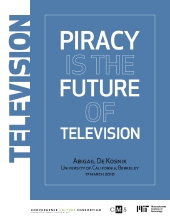Over the next few weeks, we'll be posting links to them here on the blog. First up:
Piracy is the Future of Television
by Abigail De Kosnik (UC Berkeley)
Consulting Researcher for the Convergence Culture Consortium

Download the executive summary or the entire research memo.
Executive Summary
Why do consumers pirate television shows? Rather than watching TV productions via legitimate media, such as broadcast/cable television (including on-demand viewing), authorized websites (Hulu, iTunes, and proprietary network sites), and purchased or rented DVD or Blu-Ray disks, millions of Internet users use peer-to-peer protocols to illegally download episodes. A common misconception is that digital pirates are motivated by economic reasons; pirated copies of media are free, while cable television subscriptions, iTunes purchases, and disks cost money. However, pirates also prefer file-sharing to Hulu, network websites, and other free legal options.
This paper will argue that online piracy is the preferred means of acquiring television for large numbers of people not because it is free, but because it is the best means currently available of consuming TV.
If studios hope to combat piracy by striking deals with Internet portals that offer television content online legally, then they will have to create business and distribution models that incorporate TV pirates' best practices. These include:
- A persistent television archive. The frustration of fans who miss one or more episodes of a TV show's season, the enduring affection for the television programs of one's youth, and TV-philes' interest in discovering older, "classic" or "lost" series, mean that there is always a demand for non-current TV content. Pirates operating over a distributed network have successfully "kept alive" TV torrents that would have been otherwise long dead, and in doing so, have proven that large segments of the television audience desire TV to be less ephemeral.
- The facilitation of high resolution, easily stored, portable personal television archives. TV programming proved to be highly popular as an object of collection as soon as the means for home recording (VCRs and DVRs) became available to consumers. Viewers enjoy archiving their favorite shows so that they can review episodes at their leisure, months or years after the original airings. Hulu and other streaming sites do not allow shows to be collected and permanently archived by the home user; YouTube videos are typically low-resolution; iTunes downloads can only be stored on one machine (and its assigned mobile devices), and are not transferable files; DVRs have a maximum storage capacity; disks are subject to breakage and require shelf space. Online pirates have overcome all of these limitations on personal television archiving.
- Access to global content. It is well known that English-speaking countries outside the U.S. are host to a significant number of TV pirates, who, annoyed by the delay of U.S. programs' export (a delay mandated by the economics of global syndication), download U.S. shows immediately after their broadcasts. However, piracy of foreign television programs is multidirectional: U.S. pirates consume a great deal of international content, either because shows produced in Britain, Japan, India and so on are difficult to obtain legally outside their countries of origin, or because they are members of a diaspora that stays connected with their home country and culture through viewing that nation's TV series. Piracy has created a "television without borders."
Many business challenges will arise if and when the media industries decide to incorporate some of the advantages of online television piracy into legitimate distribution models. This paper will not attempt to solve all of these issues (though it will propose some possible resolutions), but it will argue that industry cannot ignore the model constructed by pirates forever. Internet piracy has given rise to a form of television consumption so superior to existing legal forms that industry must, sooner or later, consider launching premium online TV services -- perhaps charging premium prices for them -- based on the discoveries and innovations of pirates.
Bio
Abigail De Kosnik is Assistant Professor at Berkeley Center for New Media and Department of Theater, Dance & Performance Studies, University of California, Berkeley. She has two books forthcoming: The Survival of Soap Opera: Strategies for a New Media Era (essay collection, co-edited with Sam Ford and C. Lee Harrington) from the University Press of Mississippi and Illegitimate Media: Minority Discourse and the Censorship of Digital Remix Culture from the University of Georgia Press. She testified in May 2009 before the U.S. Copyright Office at their hearings regarding the Digital Millennium Copyright Act, in favor of an exemption to the DMCA's ban on the circumvention of digital copyright technologies that would allow non-Film Studies college professors to rip DVDs for the purpose of screening clips of film and television in their courses. She is organizing a conference (currently scheduled for February 2010) on Open Source and the Humanities, sponsored by the Berkeley Center for New Media. She can be reached at adekosnik@berkeley.edu.



